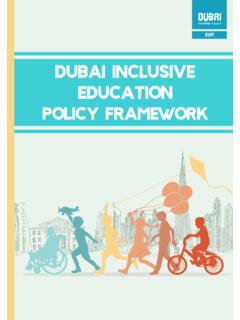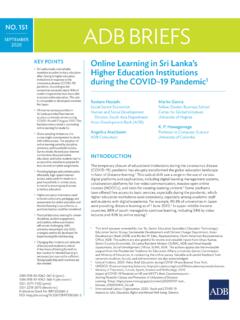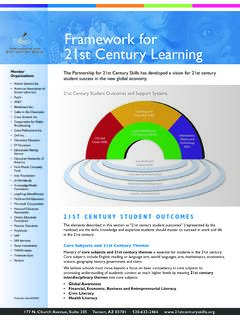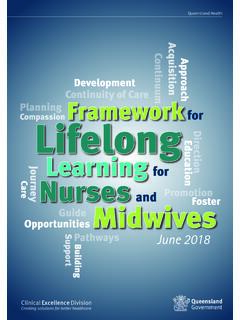Transcription of Distinguishing between Theory, Theoretical Framework, and …
1 International Journal of higher Education Vol. 7, No. 6; 2018. Distinguishing between Theory, Theoretical framework , and Conceptual framework : A Systematic Review of Lessons from the Field Dr. Charles Kivunja1, PhD. 1. School of Education, University of New England, Armidale NSW 2351, Australia Correspondence: Dr. Charles Kivunja, PhD., School of Education, University of New England, Armidale NSW 2351, Australia. E-mail: Received: October 24, 2018 Accepted: November 26, 2018 Online Published: December 3, 2018. URL: Abstract Across many years of teaching Research Methods and assessing many applications for admission into higher degree studies which require an understanding of theories, principles, strategies and skills needed to complete a higher degree such as a Masters or a PhD, one of the things I have found problematic for many students is the inability to articulate differences between theory, Theoretical framework and a conceptual framework for a proposed research project.
2 This paper uses experiential methodology to draw upon my experience in practice, and systematic literature review methodology to draw upon supporting scholarly literature by leaders in the field, to contribute to existing knowledge on the meaning of each of these concepts, and more importantly to distinguish between them in a study of Research Methods, and in particular as they relate to designing a research proposal and a thesis for a higher degree. The primary aim is to help the reader develop a firm grasp of the meaning of these concepts and how they should be used in academic research discourses. The review answers five questions.
3 1. What does each of these terms mean? 2. When and how should each be used? 3. What purposes does a Theoretical framework serve? 4. How do you develop a Theoretical framework for your research proposal or thesis? 5. What does a good Theoretical framework look like? Keywords: theory, Theoretical framework , conceptual framework , research proposal, thesis 1. Introduction Either from marking assessment tasks of my higher Degree Research (HDR) students that have to complete Research Methods to be allowed to apply for admission into a higher degree, or from evaluating research proposals as a member or chair of the Confirmation Panel or Committee that assesses applications for confirmation of candidature into a higher degree at my university, or as an External Examiner of theses from several universities, I.
4 Have learnt that the concepts of theory, Theoretical framework , and conceptual framework are among those topics on which we, as educators of HDR students, should spend a lot more time. Why? Because many students appear to have considerable difficulties with these concepts. For example, they use terms like my theory is, my conceptual framework is, my Theoretical schema is, as though these terms are directly interchangeable. Most of them use these terms when in fact all they want to convey is how they have used some theories in their thesis or how they propose to use theory they consider relevant to their research.
5 Some add to the confusion by saying things like my theory is phenomenology or my theory is grounded theory, and even my Theoretical paradigm is - . I say we need to spend more time on this topic because it appears not to have attracted much attention in the large amounts of good books that exist on Research Methods in education and the social sciences. It would also appear that much as it is widely accepted that Research Methods is a specialised subject where terminologies have specific meanings, this understanding tends to be relaxed when many authors write about using theories in their research, and they, for instance use the terms theory, conceptual framework and Theoretical framework as though they all mean the same thing, and therefore interchangeable.
6 In everyday speech it is quite common for someone to say I have a theory, and by the end of the day a person might have claimed to have several theories. In Research Methods, however, very few of the very best scholars have a theory they can call their own. In education and the social sciences in particular, unless you have mastery of grounded theory methodology, chances are you would not be able to develop a theory. In consideration of this substantial challenge, I have designed this paper to achieve five objectives, which correlate to the five questions posed above. Firstly, it should help the reader to develop an understanding of what we mean by a theory and a Theoretical framework for a research project.
7 Second, it should help a distinction between a Theoretical framework , Published by Sciedu Press 44 ISSN 1927-6044 E-ISSN 1927-6052. International Journal of higher Education Vol. 7, No. 6; 2018. and a conceptual framework . Thirdly, the paper makes it clear that whereas every good thesis should have a Theoretical framework , every PhD thesis must develop and use one, because of the very important role a Theoretical framework plays in the analysis and making meaning of your data. Fourthly, the paper explains how a Theoretical framework for a research project is developed. Finally, I provide an example of the development of a real Theoretical framework and explain how it could be applied in data analysis.
8 2. Systematic Literature Review Methodology: What Is a Theory? A systematic review of pertinent literature provides the understanding that a theory is a generalised statement of abstractions or ideas that asserts, explains or predicts relationships or connections between or among phenomena, within the limits of critical bounding assumptions that the theory explicitly makes (Gabriel, 2008). The generalised statement brings together ideas, interrelated concepts, definitions, and propositions that explain or predict events or situations by specifying relations among variables (Glanz, 2008, p. 114). The ideas, concepts and themes, constitute a deep and broad base of knowledge in the discipline which constitutes the theory.
9 These ideas, concepts, and themes together comprise the theory, which enables us to explain the meaning, nature, relationships, and challenges asserted, or predicted to be associated with a phenomenon in an educational or social sciences context, so that an application of those attributes of the theory, enables us to understand the phenomenon and to act more appropriately (Asher, 1984), including ability to predict. In line with this understanding, Kerlinger and Lee (2000, p. 11) define and explain the meaning of a theory very well, as follows: A theory is a set of interrelated constructs (concepts), definitions, and propositions that present a systematic view of phenomena by specifying relations among variables, with the purpose of explaining and predicting the phenomena.
10 This definition says three things: (1) a theory is a set of propositions consisting of defined and interrelated constructs, (2) a theory sets out the interrelations among a set of variables (constructs), and in so doing, presents a systematic view of the phenomena described by the variables, and (3) a theory explains phenomena; it does so by specifying which variables are related to which variables and how they are related, thus enabling the researcher to predict from certain variables to certain other variables. The propositions and interrelationships of a theory that are explained very well in this quote of Kerlinger and Lee (2000) can be simplified by a metaphor.














